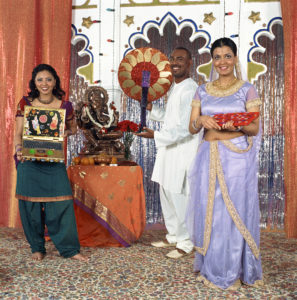
The world has no shortage of religions. Recent reports state that there are currently more than 4,200 different religions being practiced around the planet. This number is only a rough estimate, meaning that there is a very good chance that there are even more religions than this. While the biggest religions tend to get the most focus in the media, namely Christianity and Islam, it can be refreshing to explore some facts about some of the others. Hinduism, for example, has plenty of followers, but many people don’t know much about it.
Most people know that Hinduism originated in India and understand that this country still has the most active followers of the religion. Outside of these basic facts, however, non-Hindus still struggle to understand some of the core concepts. By familiarizing yourself with the practices and rituals of this ancient belief system, it can be very easy to understand.
Shared but Different
To begin, it can be important to understand that Hinduism is an umbrella term. Like Christianity, there are many different subsets that can be found within the populations who follow this religion. This means that a vast majority of Hindus will have similar shared beliefs in some areas but differ when it comes to more specific ideas. This may have something to do with the way that the religion was initially formed. Unlike Christianity and other large religions that have specific founders, Hinduism is considered to have no founder and is instead a synthesis of many older belief systems.
Although the origins of the religion date much farther back, a vast majority of scholars and theologians believe that the modern version of Hinduism as a synthesized religion began to take form sometime around 500 BCE. Essentially, the various belief systems and rituals that existed in India and Nepal at the time were fused together to craft a more cohesive and rich system to guide followers. It can also be useful to understand that there is no one specific “text” involved with Hinduism in the way that Christians have the Bible and Muslims have the Quran.
Common Tenants of Hinduism
Hinduism has spread across the world over the centuries. While you are likely to find large populations in nations like America and the United Kingdom, it is interesting to note that specifics surrounding rituals will vary. This is because Hinduism often adopts local culture and customs. Despite these differences, there are some common tenets that almost all Hindus share. Most Hindus believe in four “Purusharthas.” Often translated as “objects of human pursuit,” these four areas are where most Hindus focus their energies in how they go about living their lives.
Of the four Purusharthas, the most common to non-Hindus is Dharma, which focuses on righteousness and moral values. The other three are Moksa, Kama, and Artha. Each focuses on a different area that is considered to be important to daily life. All of the different Purusharthas are considered to be equally important, though specific situations often demand that Dharma be put first so as to find the moral truth in a situation. Many Hindu scholars believe that Dharma is most important because the other Purusharthas would not exist without order and righteousness in society.
A Million Facts
Understanding Hinduism can require a lifetime of research. The ancient nature of the religion and its diverse origins make it a fantastic area of study for people of all backgrounds. Learning more about this religion can help to bridge cultural gaps and offer insight on the colorful and vibrant traditions of different peoples of the world. There are a million facts that you can discover when you start to scratch the surface, and a lifetime of fascinating information awaits you when you begin the journey of learning.

